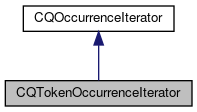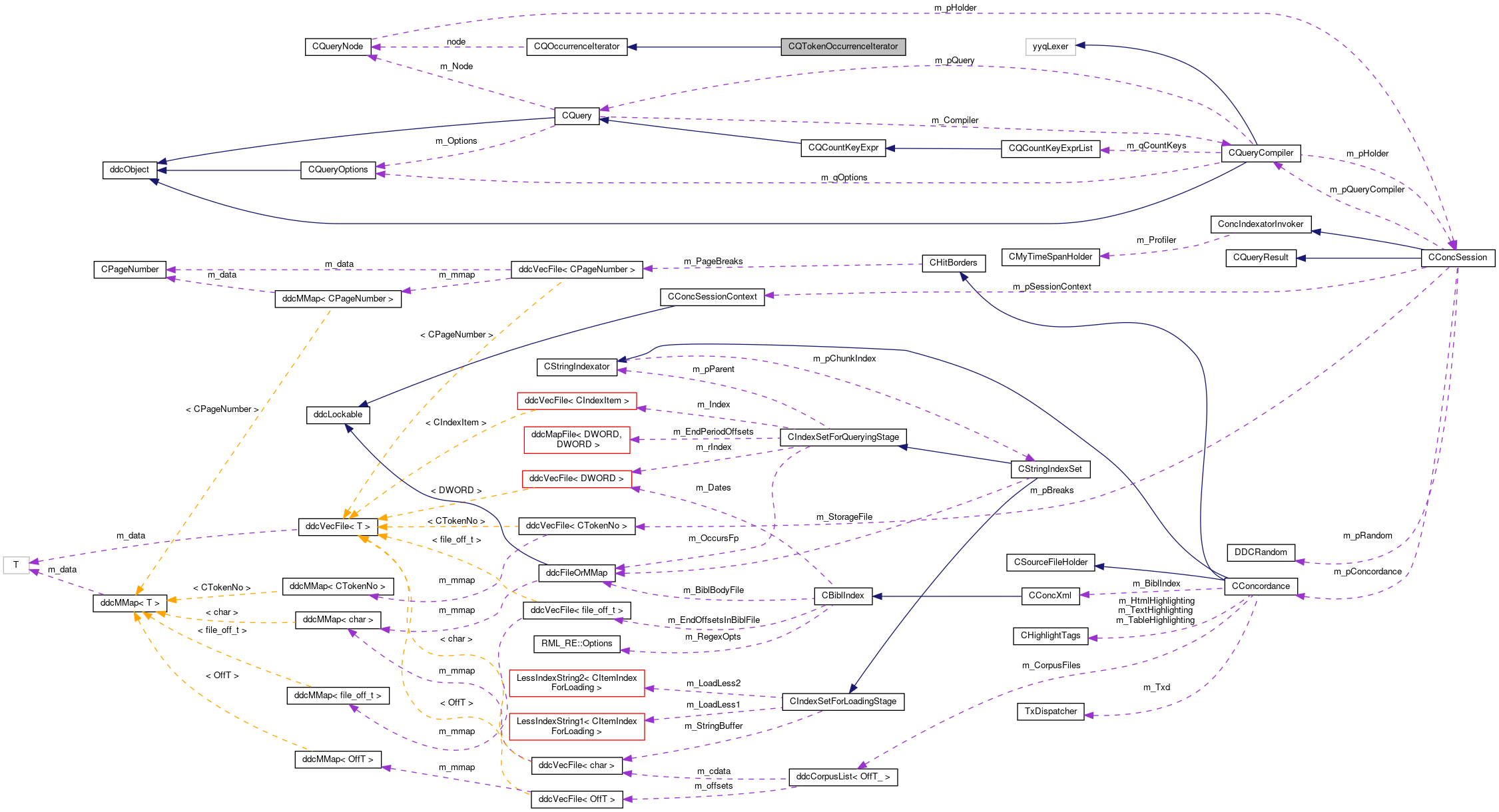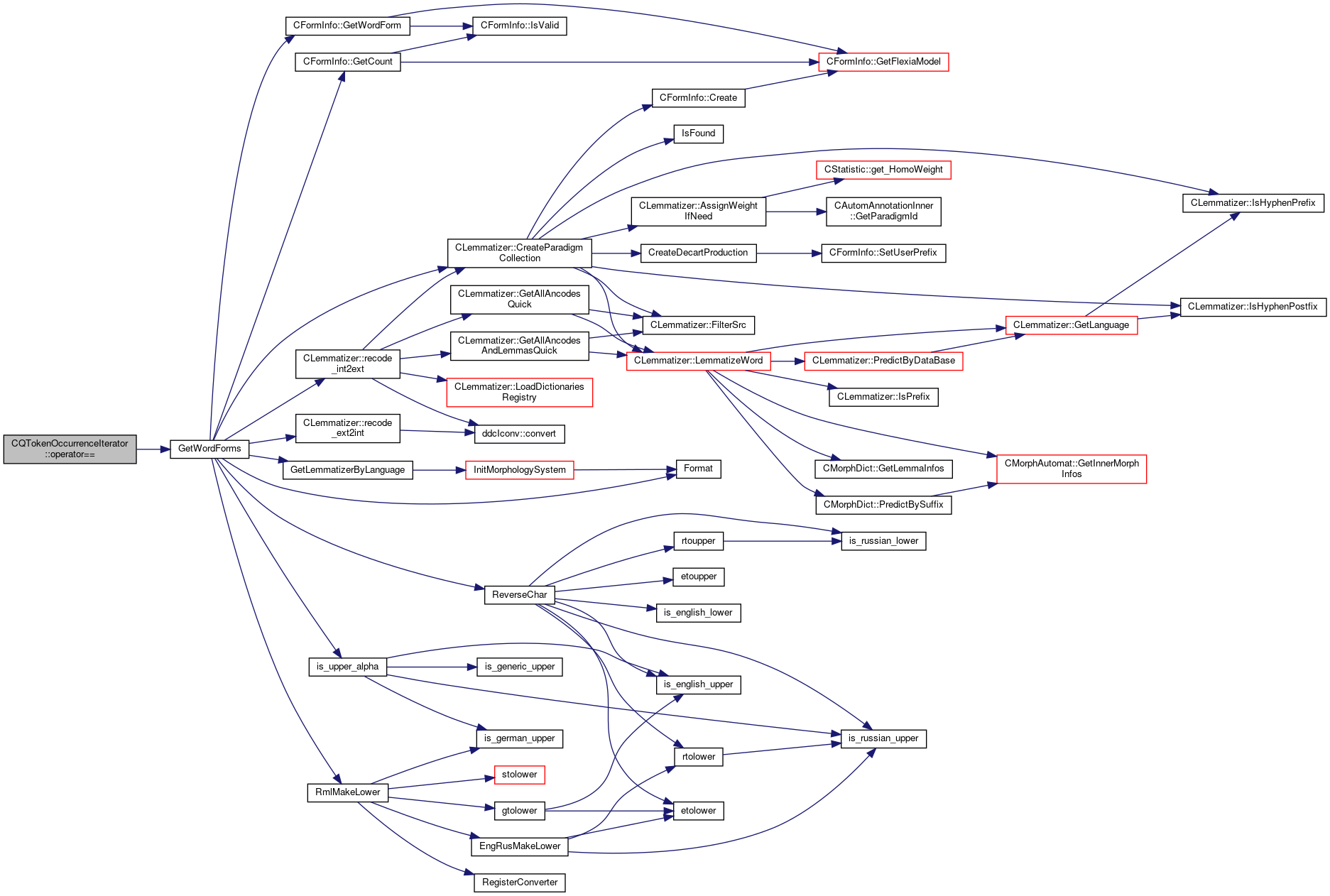CQTokenOccurrenceIterator (formerly CQNearEvalItem) is used to iterate over query occurrences;. More...
#include <QueryNode.h>


Public Attributes | |
| DWORD | stride |
| average number of tokens between occurrences in node More... | |
 Public Attributes inherited from CQOccurrenceIterator Public Attributes inherited from CQOccurrenceIterator | |
| CQueryNode * | node |
| (sub)query node More... | |
| int | cnt |
| limit for node->m_Occurrences[] More... | |
| int | cur |
| index into node->m_Occurrences[] More... | |
| DWORD | chpos |
| index into node->m_ChunkLengths[] (match occurrence) More... | |
Detailed Description
CQTokenOccurrenceIterator (formerly CQNearEvalItem) is used to iterate over query occurrences;.
- used by phrase ("") queries, appropriate for iterating over single-token query nodes (assumes all node->m_ChunkLengths[i]==1)
- disregards chpos
Constructor & Destructor Documentation
◆ CQTokenOccurrenceIterator() [1/2]
|
inline |
default constructor
◆ CQTokenOccurrenceIterator() [2/2]
|
inline |
copy constructor
◆ ~CQTokenOccurrenceIterator()
|
inlinevirtual |
Member Function Documentation
◆ bind()
| void CQTokenOccurrenceIterator::bind | ( | CQueryTokenNode * | node_, |
| const CQTokenOccurrenceIterator & | src, | ||
| int | minOffset, | ||
| int | maxOffset | ||
| ) |
Create an iterator bound to the neighbors of src, used to avoid expensive EvaluateWithoutHits() for universal sub-queries as near() arguments. Destructively alters node_->m_Occurrences[] (and associated vectors). Generates a "bound" occurence in node_->m_Occurrences[] for each source-occurence occi = src.node->m_Occurrences[i] and each offset off with minOffset <= off <= maxOffset representing token *occi + off, modulo off==0.
- Parameters
-
node_ universal wildcard node in which to create bound occurrences. src source iterator to use for occurrence generation (should already have been populated by EvaluateWithoutHits()) minOffset minimum offset for bound occurrences wrt source-occurrence maxOffset maximum offset for bound occurrences wrt source-occurrence (inclusive)
References CQOccurrenceIterator::cnt, CQueryTokenNode::m_bAny, CQueryTokenNode::m_MatchId, CQueryTokenNode::m_NodeIndex, CQueryNode::m_Occurrences, and CQOccurrenceIterator::node.
◆ operator=() [1/2]
|
inline |
assignment operator
References CQOccurrenceIterator::operator=(), and stride.

◆ assign()
|
inline |
node-assignment : inherited
References CQOccurrenceIterator::assign().

◆ operator=() [2/2]
|
inline |
◆ chunksize()
|
inline |
get size of current occurrence-chunk: override
◆ tmin()
|
inline |
◆ tmax()
|
inline |
◆ operator++()
|
inline |
◆ seek()
|
inline |
References DDC_OCCITER_LB_COEF, and log2u32().
Referenced by CQueryWithNode::EvaluateWithoutHits().


◆ operator==()
|
inline |
References CQOccurrenceIterator::cur, GetWordForms(), CQueryNode::m_Occurrences, and CQOccurrenceIterator::node.

Member Data Documentation
◆ stride
| DWORD CQTokenOccurrenceIterator::stride |
average number of tokens between occurrences in node
Referenced by operator=().
The documentation for this struct was generated from the following files:

 1.8.13
1.8.13